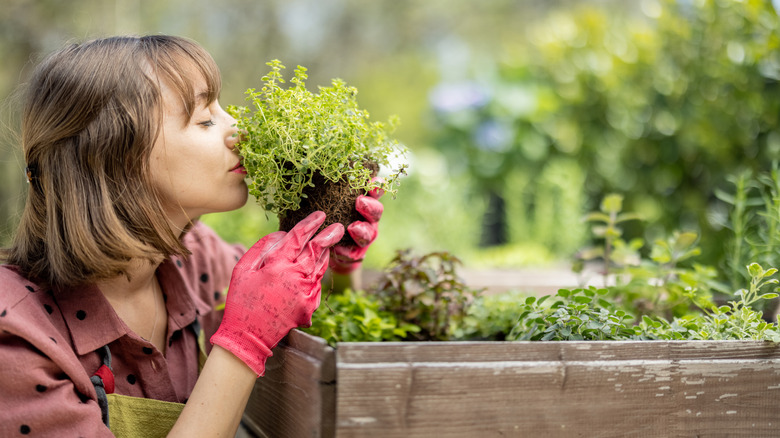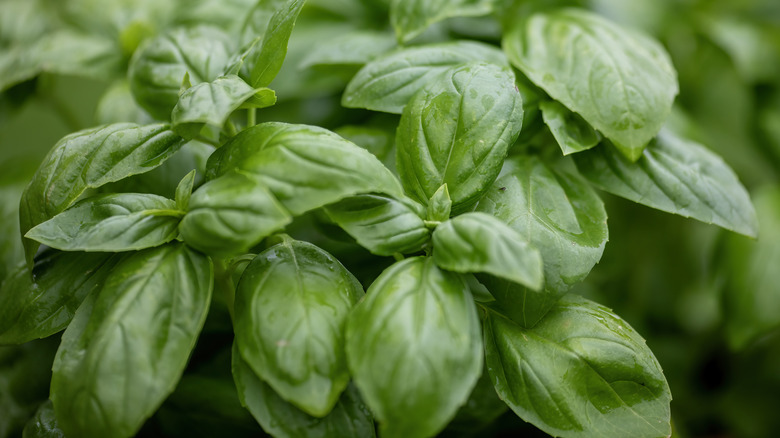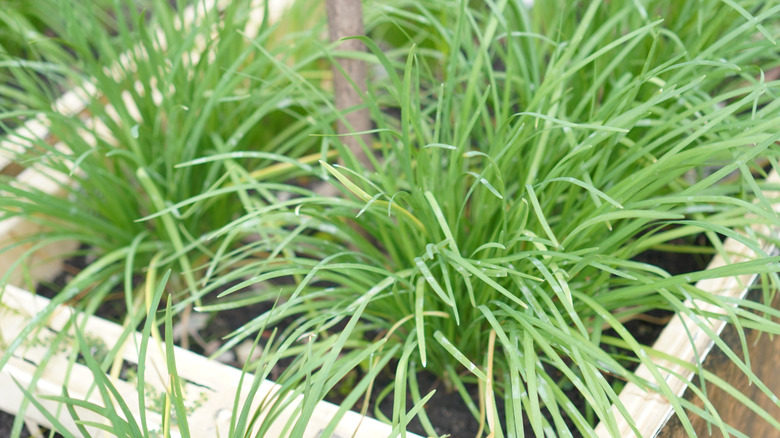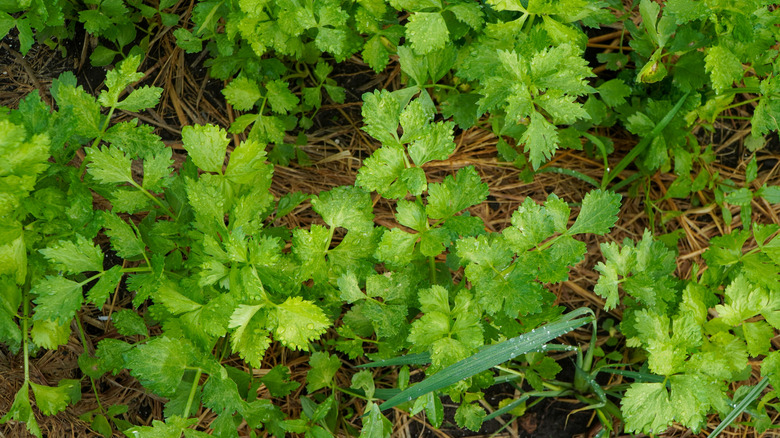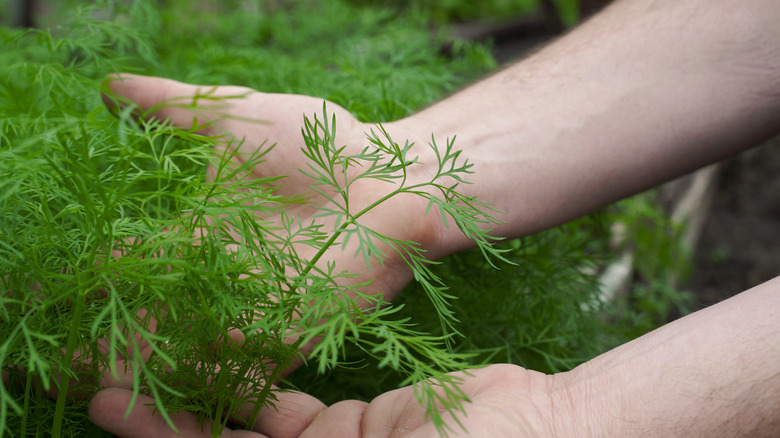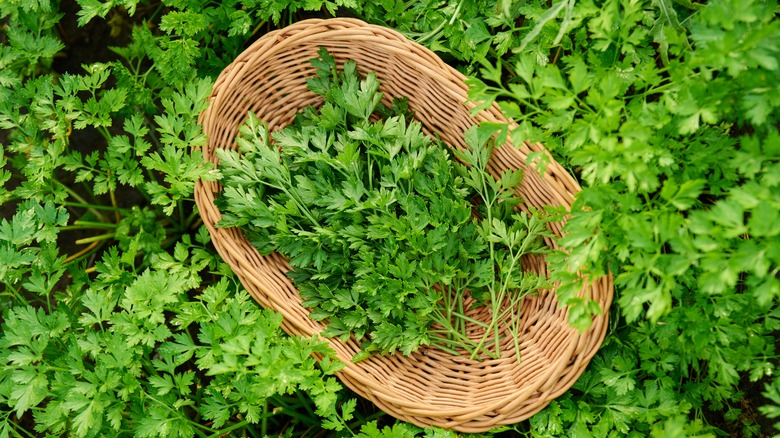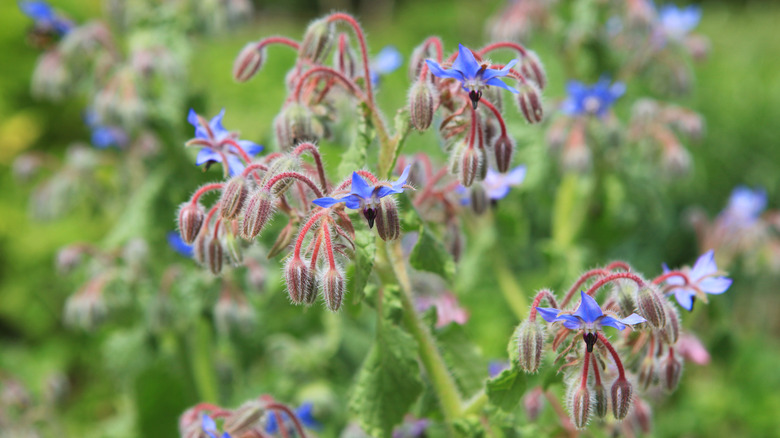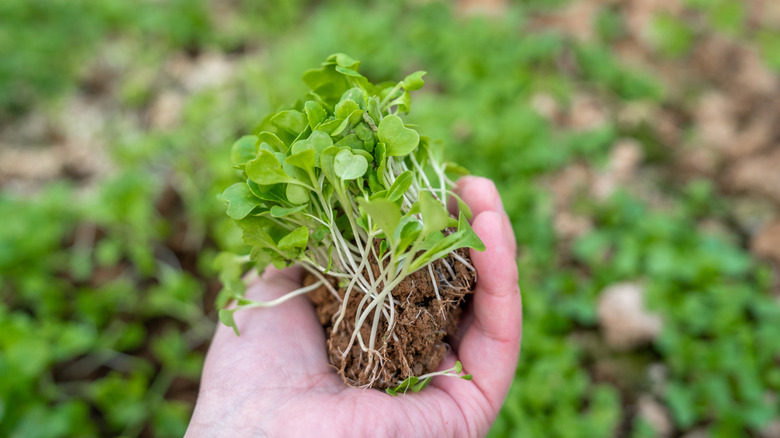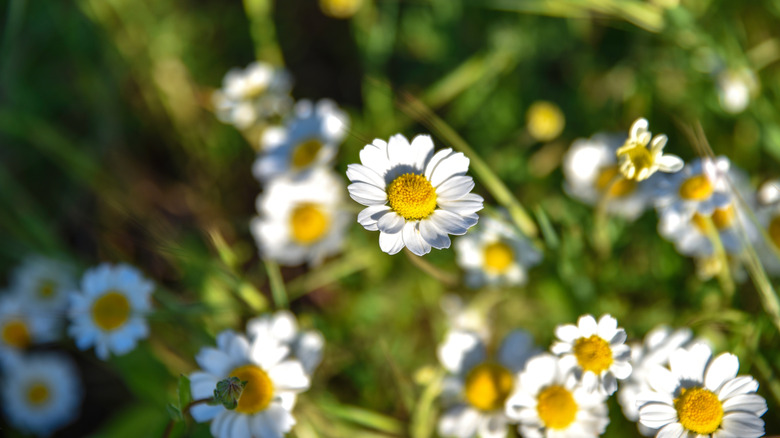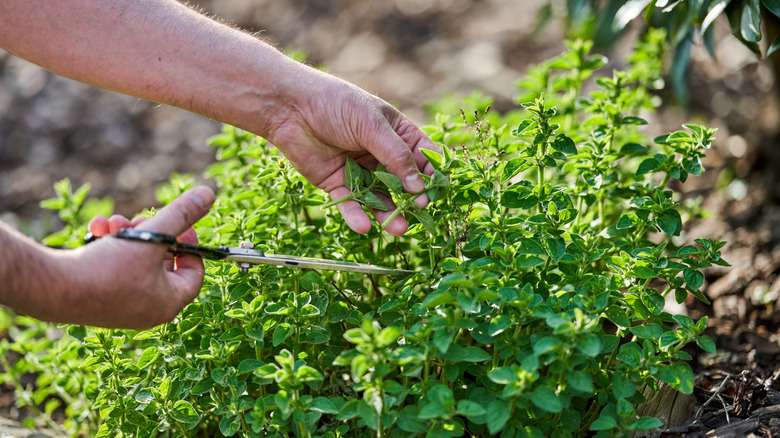9 Herbs You Can Plant In The Garden By Hand-Sprinkling The Seeds
Planting an herb garden is almost always a good idea, especially if you love to cook. For many homeowners, the first step in growing a thriving herb garden is deciding what type of aesthetic you want. Some gardeners might prefer perfectly straight rows or plants meticulously spaced out and labeled. But if you're looking to take on a more naturalistic and wilder look, you can try the popular hand-sprinkling method that will give your garden a meadow effect, making it not only productive but even more beautiful. Hand-sprinkling, also known as broadcasting or hand-sowing, is a method of tossing seeds over a prepared area to achieve a lush, organic feel to your garden and move away from a rigid, uniformed layout.
This technique starts by preparing the soil. First, you weed the area to eliminate the competition. Then, cultivate and aerate the soil, and rake the surface until it has a fine, crumbly texture. Once you've done that, you can scatter handfuls of seeds across the soil — just make sure there's not too many in concentrated in one area. Rake over the area again and water it so they settle in, and just like any other garden, you should start to see your plants sprout up. But before you begin the process, you'll want to keep in mind that not all herb plants work well for this method. So, once you have prepared the best type of soil for growing herbs, look into these plants that are particularly well-suited for this technique.
Basil
Basil (Ocimum basilicum) is one of the world's most popular culinary herbs. With its sweet, peppery aroma and glossy green leaves, it is both delicious and beautiful — making it kind of a must in any herb garden. It also happens to thrive when hand sprinkled in your garden, especially if grown with strong companion plants. Basil is one of the top herbs suited for this type of planting method due to its small seeds that are able to tolerate light. Because of this, they're perfectly happy to be planted close to the surface.
Chives
As a member of the onion family, chives (Allium schoenoprasum) are a great herb to include in your garden, offering a mild onion flavor with just enough versatility to make them a clear necessity. Since chive seeds are very small, they also work well for hand-sprinkling. These perennials are cold-tolerant and prefer full sun, needing six to eight hours of light daily for ideal growing conditions. They also make friends in the garden by helping deter aphids and keeping common pests away.
Coriander
If any plant can beat out basil as one of the top culinary herbs in the world, it would be coriander, also known as cilantro (Coriandrum sativum) — a favorite used in many types of cuisines. With its delicate, feathery leaves, this aromatic herb will offer not only a delicious addition to your weekly meals, but some beautiful texture to your herb garden. The plant grows well in the natural, clustered fashion that hand-sprinkling allows, and will thrive in cool, sunny, or lightly shaded areas of your garden.
Dill
Dill (Antheum graveolens) is a popular herb to add to dips, fish dishes, soups, and, of course, pickle brine. It's also a seed that really wants to be sown directly where you plan to let it grow. Because of its long taproot, dill is notoriously difficult to move once it's started to germinate. Any disruption to the root almost always results in transplant shock, making this herb very well-suited for the scatter sowing method. Dill seeds also require lots of light to germinate and are a great companion plant to fennel.
Parsley
Parsley (Petroselinum crispum), with its curly or flat leaves, has an endless amount of culinary uses in the kitchen, but it will also create a lush, green carpet in your garden at the same time. Even though this herb is slow to germinate, taking 4 to 8 weeks, it still responds well to the hand-sprinkling method, especially since parsley seeds do not need to be covered. Parsley makes an excellent companion plant, especially for basil, and helps attract beneficial insects. Just remember to water it thoroughly every week for it to thrive.
Borage
The borage plant (Borago officinalis) is known for its striking blue, star-shaped flowers and crunchy leaves that have an herbal cucumber taste. While borage has good seeds for hand-sprinkling, it also makes a strong companion plant to many vegetables, like tomatoes and spinach, as well as herbs, like basil — boosting its essential oil content and enhancing the flavor. Borage seeds are large, but they readily self-seed, which makes the plant low maintenance. Its bright flowers even mean it's a favorite for pollinators and attracting beneficial insects.
Cress
Cress (Lepidium sativum) — sometimes known as pepper-grass — is a low-maintenance plant, perfect to grow if you don't have a green thumb. The peppery tasting leaves of the garden cress plant are popularly used in salads and on sandwiches, making it well-suited for a backyard garden. It is super easy to grow with the broadcasting method by scattering the seeds, and will thrive in moist soil with full sun exposure or partial shade.
German chamomile
German chamomile's (Matricaria chamomilla) sweet, apple-like flavors are not only a delicious addition to many dishes, most notably your nighttime tea, but the delicate daisy-like flowers will add so much beauty to your herb garden. Chamomile seeds are small, which we know makes them a good candidate for scatter sowing. They are also amazing companion plants, because their strong scent is known to repel garden pests. They hang out well with herbs like basil, boosting essential oil content and enhancing flavor.
Oregano
Oregano (Origanum vulgare) has so much to offer in the kitchen and in the backyard, but it doesn't take much work to plant if you use the hand-sprinkling method. Its strong, earthy flavor and peppery aroma can elevate a simple dish, but it really delivers in the garden. Oregano likes to hang out with other plants and helps attract bees, butterflies, and other beneficial insects. Just as it helps bring wanted visitors, its strong aroma helps keep pests away, making it an ideal herb to add to your space.
